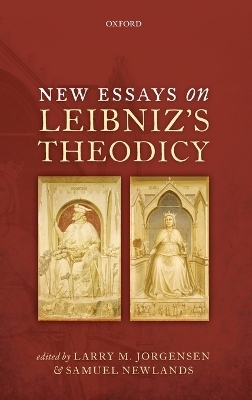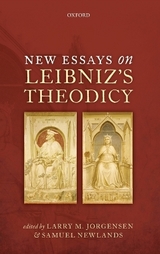New Essays on Leibniz's Theodicy
Oxford University Press (Verlag)
978-0-19-966003-2 (ISBN)
In 1710 G. W. Leibniz published Theodicy: Essays on the Goodness of God, the Freedom of Man, and the Origin of Evil. This book, the only one he published in his lifetime, established his reputation more than anything else he wrote. The Theodicy brings together many different strands of Leibniz's own philosophical system, and we get a rare snapshot of how he intended these disparate aspects of his philosophy to come together into a single, overarching account of divine justice in the face of the world's evils. At the same time, the Theodicy is a fascinating window into the context of philosophical theology in the seventeenth century. Leibniz had his finger on the intellectual pulse of his time, and this comes out very clearly in the Theodicy. He engages with all of the major lines of theological dispute of that time, demonstrating the encyclopaedic breadth of his understanding of the issues.
Leibniz's Theodicy remains one of the most abiding systematic accounts of how evil is compatible with divine goodness. Any treatment of the problem of evil must, at some point, come to grips with Leibniz's proposed solution. This volume refreshes and deepens our understanding of this great work. Leading scholars present original essays which critically evaluate the Theodicy, providing a window on its historical context and giving close attention to the subtle and enduring philosophical arguments.
Larry M. Jorgensen is an Assistant Professor of Philosophy at Skidmore College in Saratoga Springs, New York. His main research is in early modern philosophy, with a primary focus on Leibniz's philosophy of mind and, more generally, on the development of the uniquely modern conception of consciousness that developed during the seventeenth century. Samuel Newlands is an Associate Professor of Philosophy at the University of Notre Dame. His main research interests lie in seventeenth century metaphysics and philosophy of religion. He has published mostly on Spinoza and Leibniz, and he is especially interested in the ways their systematic philosophical views intersect discussions in contemporary metaphysics and philosophy of religion.
Acknowledgements ; Introduction ; 1. Prefacing the Theodicy ; 2. Which "Reason"? Bayle on the Intractability of Evil ; 3. Is Leibniz's Theodicy a Variation on a Theme by Malebranche? ; 4. Justice and Circumstances: Theodicy as Universal Religion ; 5. The Theoretical Foundations of the Leibnizian Theodicy and its Apologetic Aim ; 6. Metaphysical Evil Revisited ; 7. Moral Evil and Divine Concurrence in the Theodicy ; 8. Vindicatio Dei: Evil as a Result of God's Free Choice of the Best ; 9. Leibniz's Dilemma on Predestination ; 10. Justice, Happiness, and Perfection in Leibniz's City of God ; 11. Monads and the Theodicy: Reading Leibniz ; 12. Leibniz's Theodicy as a Critique of Spinoza and Bayle-and Blueprint for the Philosophy Wars of the Eighteenth Century ; Bibliography
| Erscheint lt. Verlag | 20.2.2014 |
|---|---|
| Verlagsort | Oxford |
| Sprache | englisch |
| Maße | 162 x 241 mm |
| Gewicht | 582 g |
| Themenwelt | Geisteswissenschaften ► Philosophie ► Ethik |
| Geisteswissenschaften ► Philosophie ► Geschichte der Philosophie | |
| Geisteswissenschaften ► Philosophie ► Philosophie des Mittelalters | |
| Geisteswissenschaften ► Philosophie ► Philosophie der Neuzeit | |
| Geisteswissenschaften ► Religion / Theologie | |
| ISBN-10 | 0-19-966003-4 / 0199660034 |
| ISBN-13 | 978-0-19-966003-2 / 9780199660032 |
| Zustand | Neuware |
| Haben Sie eine Frage zum Produkt? |
aus dem Bereich




